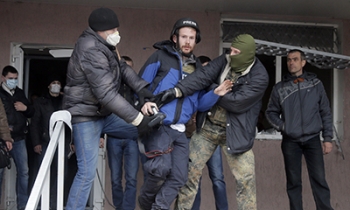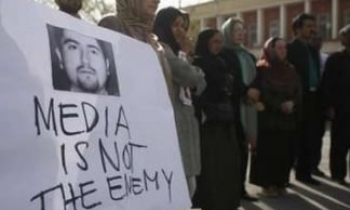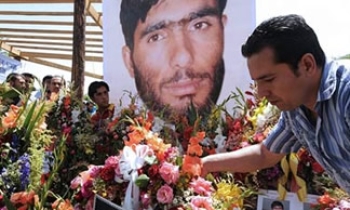An obscure Islamist group has threatened to behead female television broadcasters if they do not wear strict Islamic dress. The threat to "cut throats from vein to vein" was delivered by the Righteous Swords of Truth, a fanatical group that has previously claimed responsibility for bombing Internet cafes and music shops. The new threat was the first time the organisation targeted a specific group of people, the Associated Press (AP) reported.
In many parts of the Muslim world, conservative policies keep women out of TV anchor positions or dictate they wear headscarves on air. Headscarves for TV broadcasters are uncommon, however, in Lebanon and Jordan, and even Egypt keeps newscasters who wear them off its TV stations.

The Righteous Swords of Truth issued the statement Friday in an email to news organisations. "We will cut throats, and from vein to vein, if needed to protect the spirit and moral of this nation," the statement said. The group also accused the women broadcasters of being "without any ... shame or morals."
“It is disgraceful that the women working for the official Palestinian media are competing with each other to display their charms,” it said in a leaflet distributed in Gaza at the weekend. “We will destroy their homes. We will blow up their workplaces. We have a lot of information about their addresses and we are following their movements.”
Reporters sans Frontières (RSF) Tuesday wrote to Palestinian Prime Minister Ismael Haniyeh asking him to identify and arrest the members of the group. “Everything must be done to guarantee the safety of these professional women. We take these threats all the more seriously as this radical group has claimed responsibility for many bombings in the Gaza Strip in recent months.”
Some of PBC’s female journalists did not go to work after the receiving the threatening message and gathered outside the presidential palace in Gaza City on June 3 to demand protection from the authorities. A larger demonstration, with about 60 participants, was organised Monday by the Palestinian journalists’ union. Parliamentary speaker Ahmad Bahar attended, in a show of condemnation for the threats.
Prior to the statement, some women broadcasters said they had received personal threats through their mobile phones. It was not clear if the threats were from the same group.
One anchorwoman who does not wear a headscarf said she was too frightened by the threat to go to work on Saturday. "It's a dangerous precedent in our society. It will target all working women," said the broadcaster, who declined to give her name out of fear. "The statement frightened us."
Another presenter who wears a headscarf said she couldn't understand why they were targeted. "I hope they take it back. I hope not a bullet will be fired at us," she said.
"Yesterday I was just sitting down and thinking, if I died, who is going to take care of my two kids?" said Lana Shaheen, 35, the Syrian-born head of English programming at Palestine TV in Gaza and an on-air correspondent for a Jordanian television network, according to a report in the Independent.
Shaheen, who has lived in Gaza for 11 years with her Palestinian husband, does not wear a headscarf. And while many of her colleagues do cover their heads, they also "wear jeans, like all journalists everywhere".

The influence of Islamic groups in the Gaza Strip has grown over the past three decades, especially as poverty has risen since fighting with Israel began in 2000. Now, it is more common to see women with their faces covered with veils than women without their hair covered, the AP report commented.
Most of the 15 women broadcasters on government-run Palestine TV wear headscarves. But they also wear makeup and Western clothing — not considered strictly observant by extremists.
Basem Abu Sumaya, head of the Palestinian Broadcasting Corporation, which runs Palestine TV, said the PBC already had security measures in place, but could not protect people on the way to work. The PBC is bankrolled by Palestinian President Mahmoud Abbas of Fatah, and is accused of openly exhibiting support for the moderate movement, a bitter rival of the Islamic group Hamas.
A senior security official, who requested anonymity because of the sensitivity of the issue, said the Swords of Truth had less than 100 members and was formed last year. The group claimed responsibility for the bombings of about three dozen Internet cafes, music shops and pool halls, which are considered places of vice by some in deeply conservative Gaza. Assailants detonated small bombs outside the businesses at night, causing damage but no injuries.
The security official said his forces were taking the threat seriously. He said Hamas members funded the group, wanting to impose a hardline version of Islam in Gaza. Hamas won parliamentary elections last year, but has since formed a unity government with Fatah.
Hamas spokesman Ismail Ridwan said his faction had "no relation" to the group.
Other hardline groups also have become prominent in Gaza in recent months. The Army of Islam claimed responsibility for kidnapping British Broadcasting Corporation (BBC) reporter Alan Johnston in March. Muslim hardliners lobbed a bomb at a UN-run school in May, accusing the world body of "turning schools into nightclubs" for holding a show of traditional Palestinian dancing.









